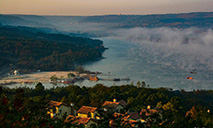Nepalese entrepreneur contributes to deepening Nepal-China friendship
“I was born in a mountainous area in Nepal, which is near China’s Tibet. When I was young, I always wanted to go to the other side of the mountain. Then, I realized my dream of going to China. My Chinese teacher gave me a Chinese name ‘Gao Liang,’ which is similar to my Nepalese name in its pronunciation,” Kalyan Raj Sharma, president of Nepal’s AOE Tourism Company, told the Global People.
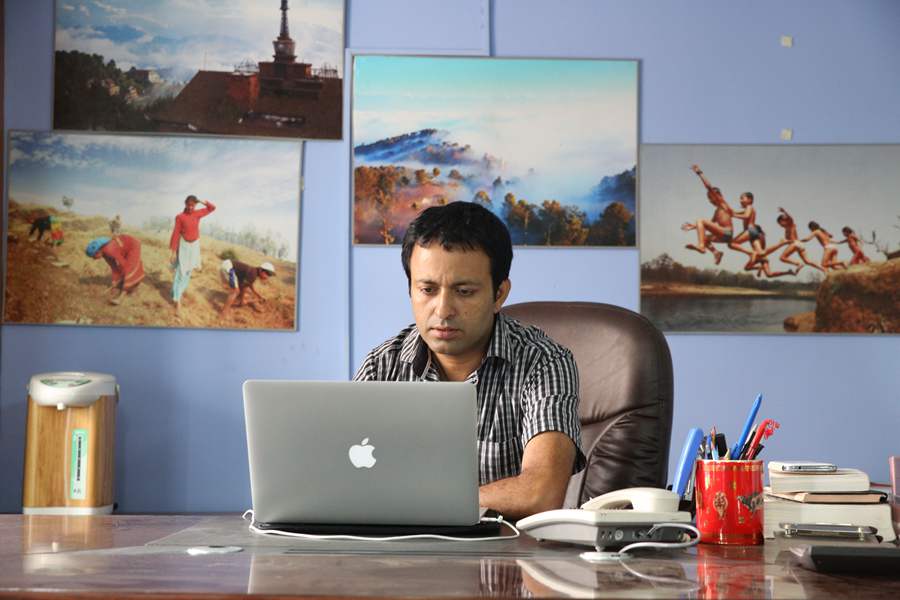
Kalyan Raj Sharma works in his company. (Photo/Global People)
Sharma started to learn about China from the book “The Art of War” by Sun Tzu. The thoughts proposed by Sun Tzu, the military strategist, such as “If you know the enemy and know yourself, you need not fear the result of a hundred battles,” deepened Sharma’s understanding of what was happening in Nepal and around the world. He had written an article on the book, believing that whoever read and understood its content would prevail themselves in the end. It was from then on that he began to cultivate a deep interest in China.
In 2007, Sharma was admitted by the School of Economics at Fudan University in Shanghai, embarking on a five-year journey to obtain a doctorate degree. Over the course of the five years, he gained a deeper understanding of Chinese culture, publishing a number of papers focusing on tourism economics, which provided a foundation for him when he began running the AOE Tourism Company after he returned to Nepal.
In 2015, a major earthquake hit Nepal, triggering an avalanche on Mount Qomolangma. Several Chinese climbers were hit by rocks falling down the mountain. After receiving a call about rescue efforts, Sharma immediately arranged a helicopter to rescue the climbers. During those days, he received numerous calls associated with the rescue operation, sleeping only four hours each day. He also provided water and food for Chinese tourists stranded at the airport and arranged buses for the tourists to have a place to rest.
Sharma believes that making friends matters more than doing business. He once sent a female Chinese climber to a local hospital after the latter was injured during an expedition to Mount Qomolangma. He also helped the woman handle insurance-related matters.
“She appreciated what I had done for her and we’ve been in touch since then. After her hometown, which is in Anhui Province in east China, was hit by floods, I made donations to support flood relief there. Asian people think alike, believing that we should treat each other nicely. This is also what I learned from the book ‘Analects of Confucius’,” Sharma said.
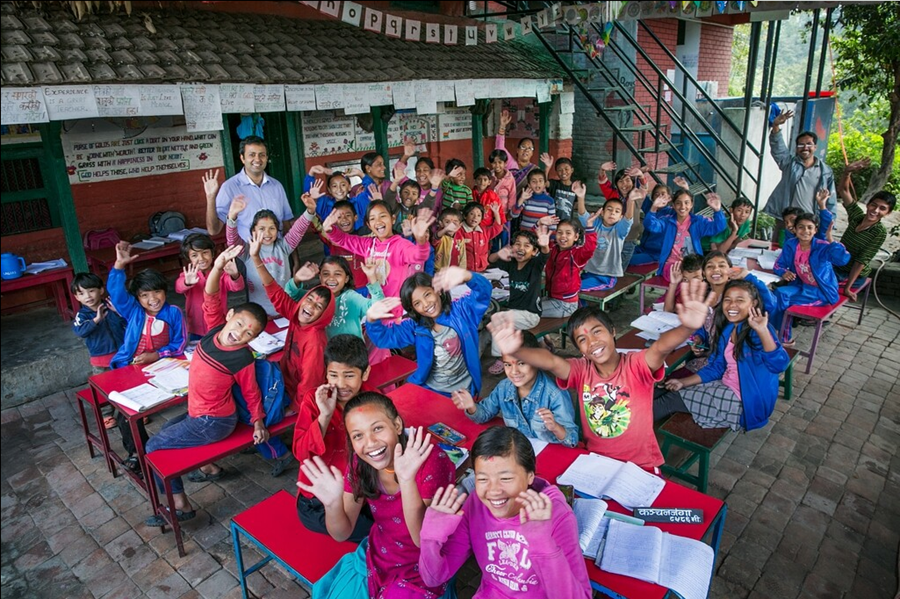
Kalyan Raj Sharma and orphans at the orphanage made out of recycled beer bottles. (Photo/Global People)
Sharma said that promoting Nepal-China cultural exchanges has become a part of his life. He would later go on to build an orphanage made out of recycled beer bottles, providing a shelter for hundreds of homeless children. After the major earthquake hit Nepal, the facility was severely damaged. It was then when some Chinese volunteers came by to help rebuild the orphanage, making donations and delivering school supplies for the children. In the concerted relief effort organized by Sharma, many Chinese people working in Nepal would participate by bringing food and clothes along with them to donate to the orphanage on a regular basis and spend holidays with the children.
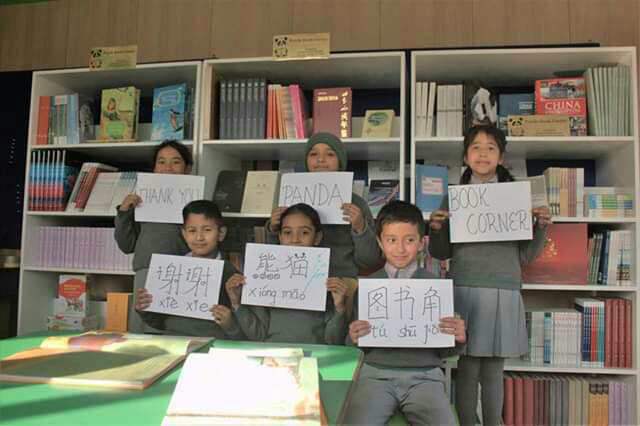
Nepalese children at the Panda Book Corner. (Photo/Global People)
Sharma has made significant progress in facilitating Nepalese children’s understanding of China. He assisted the Chinese Embassy in Nepal to advance a project called the Panda Book Corner, which donated Chinese-language books to local schools. Students who learned about China through the books expressed their hope to visit China one day. Having learned about these sentiments, Sharma decided to organize about 700 Nepalese students to visit China on a series of study tours. The study tours have since become a regular activity held every year.
“China was the first international travel experience for many students. I also arranged for them to communicate with Chinese students at similar ages so that they could deepen their mutual understanding,” Sharma expressed.
Sharma opened a selective course on doing business in China at Kathmandu University to introduce China’s economic development experience to the country’s students. He also initiated a lecture tour across universities in Nepal. The classes proved to be very popular.
Sharma also founded the Nepal China Friendship Forum and the Trans-Himalaya Development Center, building platforms for strengthening people-to-people exchanges between China and Nepal. Up until now, Sharma has organized four seminars associated with the Belt and Road Initiative (BRI).
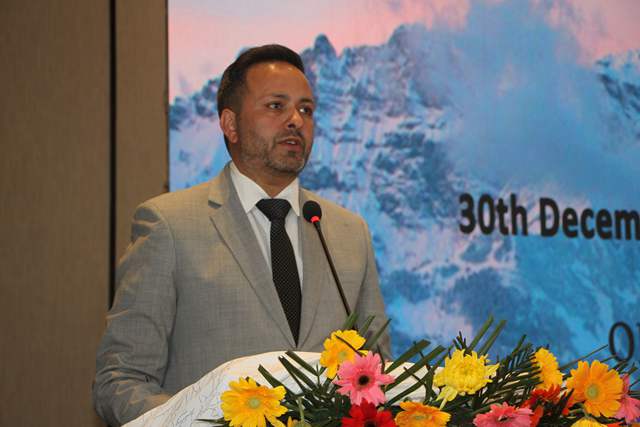
Kalyan Raj Sharma speaks at a forum on Trans-Himalaya connectivity cooperation. (Photo/Global People)
The BRI has contributed enormously to Nepal’s poverty reduction drive, he pointed out, saying that he planned to introduce more of China’s experience in poverty alleviation to Nepal through the platforms.
Sharma has published articles to voice support for China. In May 2020, he published articles on China’s anti-pandemic experience in three journals. One month later, he published a commentary to voice support for the country’s law on safeguarding national security in the Special Administrative Region of Hong Kong, saying in the article that there were about 30,000 Nepalese living in the Hong Kong region, and their security and well-being would be safeguarded in a stable Hong Kong. He also pointed out that certain Westerners with ulterior motives who had instigated chaos in Hong Kong were jealous of the long-term growth achievements of the Chinese economy.
Sharma expressed that driven by the BRI, China and Nepal can further deepen exchanges, saying he expects China would voice more support for multilateralism and mutually beneficial cooperation on behalf of developing countries.
Photos
Related Stories
- Chinese charity fund spends 6 mln USD on Nepal projects since 2015
- Nepal-China cooperation moves ahead amid COVID-19 pandemic
- China to continue supporting Nepal's post-earthquake reconstruction: FM
- China hands over books to more Nepali schools under "Panda Book Corner" project
- Nepal receives 1.6 mln doses of China-donated COVID-19 vaccine
- Pledged Chinese FDI commitment in Nepal surges in Q1 of FY 2021-22
Copyright © 2022 People's Daily Online. All Rights Reserved.









